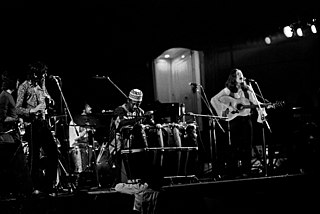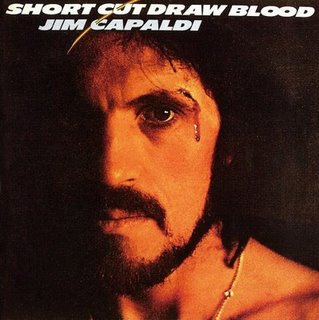
Traffic were an English rock band formed in Birmingham in April 1967 by Steve Winwood, Jim Capaldi, Chris Wood and Dave Mason. They began as a psychedelic rock group and diversified their sound through the use of instruments such as keyboards, sitar, and various reed instruments, and by incorporating jazz and improvisational techniques in their music.

Stephen Lawrence Winwood is an English musician and songwriter whose genres include blue-eyed soul, rhythm and blues, blues rock and pop rock. Though primarily a guitarist, keyboard player and vocalist, prominent for his distinctive soulful high tenor voice, Winwood plays other instruments proficiently, including drums, mandolin, bass and saxophone.

Traffic is the second studio album by the English rock band of the same name, released in 1968 on Island Records in the United Kingdom as ILPS 9081T (stereo), and United Artists in the United States, as UAS 6676 (stereo). The album peaked at number 9 in the UK Albums Chart and at number 17 on the Billboard Top LPs chart. It was the last album recorded by the group before their initial breakup.

Nicola James Capaldi was an English singer-songwriter and drummer. His musical career spanned more than four decades. He co-founded the progressive rock band Traffic in 1967 with Steve Winwood with whom he co-wrote the majority of the band's material. He was inducted into the Rock and Roll Hall of Fame as a part of Traffic's original lineup.

David Thomas Mason is an English singer-songwriter and guitarist from Worcester, who first found fame with the rock band Traffic, and went on to play and record with many notable pop and rock musicians, including Paul McCartney, George Harrison, the Rolling Stones, Jimi Hendrix, Eric Clapton, Michael Jackson, David Crosby, Graham Nash, Steve Winwood, Fleetwood Mac, Delaney & Bonnie, Leon Russell, and Cass Elliot.

Captured Live at the Forum is the third album by American rock band Three Dog Night, released in 1969.

John Barleycorn Must Die is the fourth studio album by English rock band Traffic, released in 1970 as Island ILPS 9116 in the United Kingdom, United Artists UAS 5504 in the United States, and as Polydor 2334 013 in Canada. It marked the band's comeback after a brief disbandment, and peaked at number 5 on the Billboard Top LPs chart, making it their highest-charting album in the US, and has been certified a gold record by the RIAA. In addition, the single "Empty Pages" spent eight weeks on the Billboard Hot 100, peaking at number 74. The album was marginally less successful in the UK, reaching number 11 on the UK Albums Chart.

Mr. Fantasy is the debut album by English rock band Traffic, released in December 1967. The recording included group members Jim Capaldi, Steve Winwood, Chris Wood, and Dave Mason; Mason temporarily left the band shortly after the album was released. The album reached the number 16 position in the UK Albums Chart, and number 88 on the Billboard Top LPs chart in the United States.

Christopher Gordon Blandford Wood was a British rock musician, best known as a founding member of the rock band Traffic, along with Steve Winwood, Jim Capaldi and Dave Mason.
Mick Weaver is an English session musician, best known for his playing of the Hammond B3 organ, and as an exponent of the blues and funk.

Welcome to the Canteen is the first live album by English rock band Traffic. It was recorded live at Fairfield Halls, Croydon and the Oz Benefit Concert in the canteen of the Polytechnic of Central London London, on 3 July 1971 and released in September of that year. It was recorded during Dave Mason's third stint with the band, which lasted only six performances.

Traffic Gold is a two-disc 2005 compilation album by the psychedelic rock band Traffic. It contains at least one song from each album except On the Road, Far from Home, and The Last Great Traffic Jam.

The Last Great Traffic Jam is a live album and DVD from the English rock band Traffic. The album was recorded on the 1994 reunion tour supporting Far from Home.

Best of Traffic is a compilation album by the band Traffic, released in 1969.
"Feelin' Alright?", also known as "Feeling Alright", is a song written by Dave Mason of the English rock band Traffic for their eponymous 1968 album Traffic. It was also released as a single, and failed to chart in both the UK and the US, but it did reach a bubbling under position of #123 on the Billboard Hot 100. Joe Cocker performed a more popular rendition of the song that did chart in the U.S. Both Traffic's and Cocker's versions appear in the 2012 movie Flight. The song had also been featured in the 2000 film Duets, sung by Huey Lewis.

Oh How We Danced is the debut studio album by the British musician Jim Capaldi. The album was recorded while Traffic was on hiatus due to Steve Winwood's struggles with peritonitis and was released by Island Records in 1972. Like his contemporary albums with Traffic, it was unsuccessful in his native United Kingdom but did better in the United States, reaching number 82 in the Billboard 200 chart and producing the hit single "Eve", which reached number 91 in the Billboard Hot 100.

Short Cut Draw Blood is the third studio album by the British musician Jim Capaldi, released by Island Records in 1975. It marked a major turning point in Capaldi's career: it was his first album recorded after the breakup of Traffic, and more importantly it was his commercial breakthrough. While Capaldi's first two solo albums had been moderately successful in the United States, Short Cut Draw Blood entered the charts in several other countries for the first time. This was particularly evident in his native United Kingdom; the single "It's All Up to You" at number 27, released a year before the album, became his first top 40 hit there, only to be overshadowed the following year by his cover of "Love Hurts", which went all the way to number 4.
"Roamin' Thru' the Gloamin' with 40,000 Headmen", written by Steve Winwood and Jim Capaldi, was first recorded by Traffic in 1967 or 1968. It was initially released as B-side to the "No Face, No Name and No Number" single in 1968 and also appears on their second album Traffic. Blood, Sweat & Tears also recorded it on their 1970 album, Blood, Sweat & Tears 3.

Winwood is the first compilation album of music featuring Steve Winwood. This two-record set was issued in 1971 by United Artists Records and features music which Winwood performed with The Spencer Davis Group, Powerhouse, Traffic and Blind Faith. UA Records issued this album after Winwood's band Traffic left UA when their home label Island Records set up their own American operation. Issued without Winwood's authorization as catalogue number UAS-9950, it was taken off the market after legal action by Winwood and Island Records. It was then reissued with minor changes as catalogue number UAS-9964. Currently out of print, it was issued on CD by Universal Music of Japan for the Japanese market.

Revolutions – The Very Best of Steve Winwood is the sixth compilation album by Steve Winwood. The album includes music from Winwood's solo career, as well as groups with which he has performed, including the Spencer Davis Group, Traffic, and Blind Faith. The CD was released as a box set and a single disc. As of October 2014, the box set is out of print, while the single disc is still available. The songs "The Finer Things" and "Roll With It" are exclusive to the single disc version and cannot be found on the box set.


















